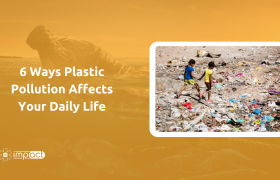Plastic pollution is more than just an environmental issue, it has seeped into our daily lives in ways we could never imagine. Read on to learn how the plastic crisis affects our daily lives.
The Hidden Microplastics in Bottled Water
Microplastics, tiny plastic particles less than 5mm in size, are increasingly being found in bottled water. These particles can leach from plastic packaging into the water, potentially posing health risks when ingested over time. To minimise this risk, many people are now turning to advanced water filters as a safeguard against microplastic pollution.
Grocery Packaging
Plastic pollution accounts for a big chunk of waste in landfills, much of which comes from food and beverages. Many of us love cooking, but plastic packaging in groceries can be a major frustration. Fresh produce wrapped in plastic and pantry staples in plastic bags means that we must spend extra time and effort finding bulk or plastic-free alternatives. To tackle this issue, consider shopping at farmers’ markets and bringing your own containers to easily find plastic-free options!
Plastic in Personal Hygiene Products
Research by the University of Edinburgh in 2024 found that approximately 90% of conventional sanitary products contain plastic components, including pads and tampons. Knowing that these products are non-biodegradable and harmful to the environment, consider switching to more sustainable options like menstrual cups and organic cotton products. It may take time to adapt, but the positive impact will be worth the change.
Plastic Waste at Festivals and Parties
Festivals and parties often fuel significant single-use plastic waste, including decorations, plates, and cups. In fact, a 2024 report by Green Party Research estimated that each large event can produce up to 500 kilograms of plastic waste. This not only contributes to environmental pollution but also strains waste management systems. To combat this, advocate for eco-friendly parties with reusable or biodegradable decoration and cutlery options.
Microplastics in Your Food
When marine animals ingest microplastics, these tiny particles make their way up the food chain, eventually landing on your plate. Consuming seafood contaminated with microplastics can expose you to harmful chemicals, affecting your health over time. To reduce your risk, opt for sustainably sourced seafood and support efforts to reduce plastic waste in oceans, ensuring cleaner waters and safer meals.
Plastic Litter at Parks and Beaches
Going for a walk in the park or spending a day at the beach often means encountering littered plastic bottles and bags. During a recent visit to Rishikesh (India), I was personally struck by the severe plastic pollution in the Ganga River, where a 2018 study estimated that around 1,500 tons of plastic waste are dumped daily. This ruins the natural beauty of these spaces. While participating in clean-up drives does provide some relief, most times feels like a relentless struggle against an ever-growing tide of plastic waste.
As you can see, plastic pollution affects us all in deeply personal ways, often interrupting our daily lives in unexpected ways. By recognising these issues, we must make more informed choices and advocate for a cleaner environment.
Join us in the fight against plastic pollution. Reduce your plastic use, support sustainable products, participate in community clean-up efforts, and recycle or upcycle your plastic waste as much as you can. Together, we can create a healthier planet for future generations.
Take action now: QS ImpACT’s Global Day of Action is tackling plastic pollution by uniting youth around the world. Commit to reducing your plastic footprint and share your journey on social media using #GlobalDayOfAction2024.
Let’s make an ImpACT, one step at a time.
Join the Global Day of Action today: https://forms.gle/a4vsuDHnAy3PYfp27

